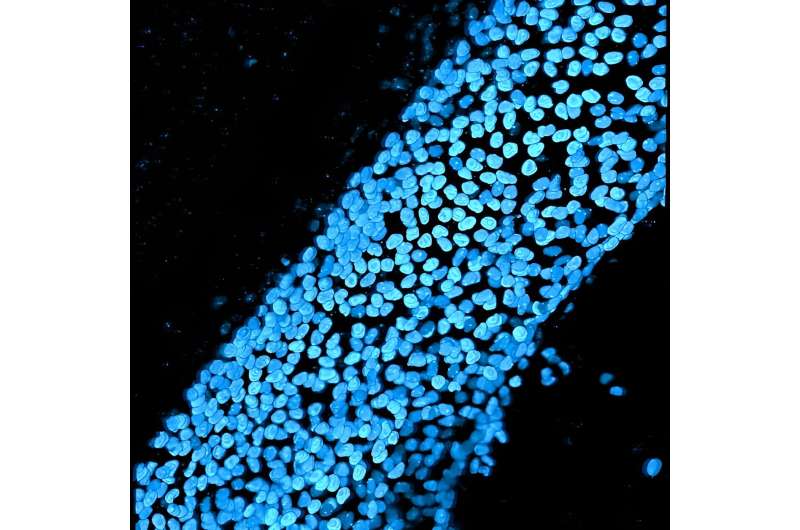This article has been reviewed according to Science X's editorial process and policies. Editors have highlighted the following attributes while ensuring the content's credibility:
fact-checked
peer-reviewed publication
trusted source
proofread
New research reveals close connection between cognitive flexibility and neurogenesis

The ability to shift from one type of cognitive problem-solving strategy to another when the circumstances change, called cognitive adaptability or flexibility, is an essential function for humans. When this ability is diminished—whether by aging, disease, trauma, or environmental exposure—mental behavior becomes more inflexible and a person has difficulty adapting to new cognitive demands and remains stuck in the previous way of thinking.
The same adverse conditions—disease and aging—also affect the process of creating new neurons long after birth (called adult neurogenesis). However, the link between the two conditions remains elusive. A team of researchers led by Stony Brook University scientists believe they have a new understanding of cognitive adaptability and the role of adult neurogenesis. Their work and findings are highlighted in two recent papers, one in the Journal of Neuroscience, and one in Frontiers in Neuroscience.
According to Grigori Enikolopov Ph.D., Professor in the Department of Anesthesiology in the Renaissance School of Medicine at Stony Brook University and the Center for Developmental Genetics of the University, and a lead author of both papers, the full range of consequences impacting cognitive flexibility remains elusive to scientists largely because of a lack of effective research models.
He and colleagues developed a new animal model centered around behavioral tasks which were designed to challenge mice to respond to various cues to get around a maze. The common version of this task requires the mouse to find a platform submerged in a water pool, remember the platform's position relative to various cues surrounding the pool (for instance circles and crosses affixed to the walls of the area), and then use these cues to navigate to the platform (as one would learn the location of a local bike shop relative to other shop signs on the same block).
The authors designed a new behavioral assay by adding other variables in the common task, such as alternating daily the color of the pool, having children's toys dangling above the pool, and changing the position of the platform (as if changing the store and building colors around the bike shop).
In The Journal of Neuroscience article, which was selected as the cover feature for the edition, the team focused on how an exposure to radiation affects cognitive flexibility and neurogenesis in the hippocampus, a brain region involved in learning and memory.
By using the test model, the team found that exposure to gamma-radiation did not affect how the mice learn the common version of the task but diminished the cognitive flexibility of the animals, as they stuck to the routine and kept searching for the platform in the old location.
"We also found that in animals exposed to this complex new task, newly generated neurons became activated by the selected features of the task, for instance by the local cues (the toys) hanging above," says Evgeny Amelchenko, Ph.D., a Research Scientist in the lab and the first author in both papers. "Intriguingly, the response was specific to those adult-generated neurons that were born three months before the test took place, but not to the younger neurons," he adds.
Since aging is associated with impairments of cognitive flexibility and other brain functions, the researchers also tested adult (6 months) and mature adult mice (14 months) using the same intricate maze task—specifically crafted to invoke cognitive flexibility. This work, described in the Frontiers in Neuroscience paper, led to the finding that age-related decline in cognitive adaptability is strongly associated with the levels of neurogenesis in the hippocampus.
According to Enikolopov, the team found a striking correlation between an animal's performance in the task and the quantities of neurons that were generated in the animal several weeks or even months before completing the task.
"Animals exposed to artificial (exposure to radiation) or natural (aging) conditions show diminished neurogenesis, delayed learning, deficient memory, and reduced use of efficient navigation strategies when confronting scenarios that require the adjustments of previously learned search strategies," explains Dr. Amelchenko. "This underscores the importance of hippocampal neurogenesis in supporting cognitive flexibility."
Remarkably, the older mice showed improvement and narrowed the performance gap with the younger mice after additional training—an indication of the older brains' accommodation capacity.
Enikolopov adds that the entire body of work detailed in both papers "points to a close-knit relationship between the extent of adult neurogenesis and cognitive flexibility, rather than conventional learning and memory processes. This connection raises the exciting prospects that augmenting neurogenesis levels could serve as a strategy for mitigating the effects of the aging- or disease-related cognitive decline."
The researchers will continue testing cognitive flexibility and neurogenesis in their model with a closer look at the cohorts of neurons born at different times before the test, and to see if their assay can be used to screen in mice for compounds that might increase cognitive flexibility. Eventually, they hope to advance the work to use fMRI in humans to understand how aging or disease affect cognitive flexibility.
More information: Evgeny M. Amelchenko et al, Cognitive Flexibility Is Selectively Impaired by Radiation and Is Associated with Differential Recruitment of Adult-Born Neurons, The Journal of Neuroscience (2023). DOI: 10.1523/JNEUROSCI.0161-22.2023
Evgeny M. Amelchenko et al, Age-related decline in cognitive flexibility is associated with the levels of hippocampal neurogenesis, Frontiers in Neuroscience (2023). DOI: 10.3389/fnins.2023.1232670



















